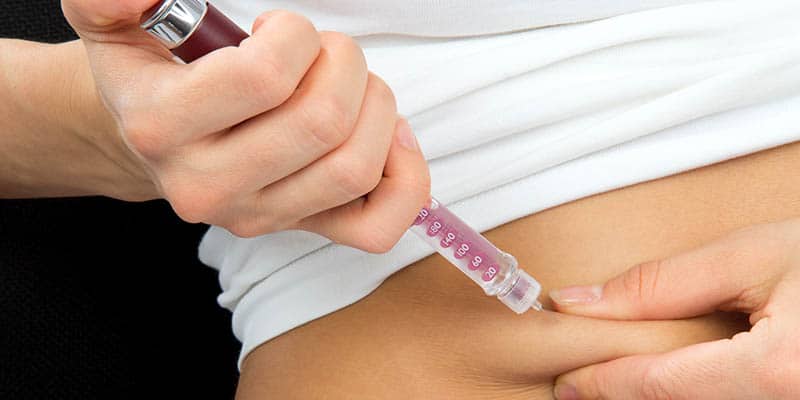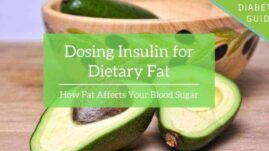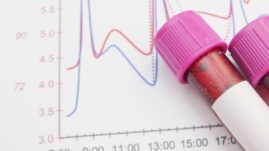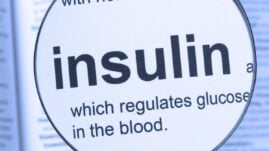Everyone with type 1 diabetes needs insulin to stay alive, and millions of people diagnosed with type 2 diabetes require insulin to control their blood glucose levels.
However, even insulin is not without its side effects. One of the most common concerns expressed by people who use insulin is that it tends to cause weight gain.
Since achieving and maintaining a healthy weight is important for everyone with diabetes, let’s discuss why this happens and what can be done about it.

Does insulin cause weight gain?
Insulin is a hormone that promotes the uptake of sugar (glucose) by almost all of the body’s cells, including muscle, liver, and fat cells.
At any given time, our cells are also burning glucose for fuel. If our fuel intake (calories eaten) is greater than our energy expenditure (calories burned), we tend to store more glucose than we burn.
Muscle and liver cells store this extra glucose in a form called “glycogen”, which is a very dense, compact form of glucose. Fat cells store the extra glucose as fat.
Starting insulin therapy can lead to weight gain for several reasons:
- Improved Glucose Absorption
Before starting insulin therapy, high blood sugar levels often mean the body isn’t absorbing nutrients efficiently. Once insulin helps glucose enter the cells, the body holds onto more calories—sometimes leading to weight gain. - Reduced Glycosuria (Sugar Loss in Urine)
Without enough insulin, excess glucose spills into urine. When insulin brings blood sugar under control, this calorie loss stops. The result? More calories stay in the body. - Increased Appetite
Insulin can sometimes trigger hunger signals. This can lead to overeating if not carefully managed. - Hypoglycemia and Overeating
Low blood sugar (a side effect of insulin therapy) often causes people to eat extra calories to stabilize glucose levels, which can add up over time.
Once insulin therapy begins and blood glucose levels come down towards normal, the excess urination and loss of glucose through the urine stop. Our cells resume storing all of our food in the form of fat or glycogen, and our weight returns to a level that is appropriate for our food intake and calorie expenditure.
In other words, insulin doesn’t cause weight gain as such; it simply restores healthy blood glucose levels and allows us to weigh what we should based on our diet and exercise patterns.
What is the average weight gain on Insulin?
Multiple studies have shown that the average person with type 2 diabetes gained up to 3 pounds (1.4 kg) in their first year of insulin use, with 10 percent gaining more than 5 pounds (2.3 kg).
The Diabetes Control and Complications Trial (DCCT) found that type 1 patients who used intensive insulin treatment gained 10 pounds (4.5 kg) more than those using less insulin; however, this weight gain disappears in long-term follow-up.
What’s the point of using insulin if it just makes me gain weight?
If you live with type 1 diabetes or have reduced insulin production, you need to take insulin to survive. You simply don’t have a choice.
Also, insulin is the most effective way to get blood sugar levels down to normal, and normal blood sugars are essential for making the kind of lifestyle changes that will ultimately help you lose body fat and maintain a healthy weight.
Elevated blood glucose levels tend to make people tired and lethargic. It is not easy to exercise when you feel that way! Lowering blood glucose levels can restore your energy and give you the strength and attitude to maintain an active lifestyle.
High blood glucose can also make you feel hungry. Keeping your blood glucose near normal will allow you to better manage your food intake, particularly the consumption of high-calorie sweets and other snacks.
In other words, gain a little today to lose a lot tomorrow.
How to stop insulin weight gain
Accept the fact that with insulin use and lower blood sugars, there is a tendency to put on some initial weight. So how can you keep yourself from gaining too much? Here are a few ideas:
Avoid hypoglycemia (low blood sugar)
If you are experiencing any low blood sugars (typically defined as a blood glucose of less than 70mg/dl), talk to your healthcare team about cutting back on the insulin that is working when the lows are taking place.
Likewise, if you need to eat to prevent low blood sugar, you may be taking too much insulin.
Not only does low blood sugar require you to eat food that you typically would not consume, but it also indicates that you are overinsulinized – taking more insulin than your body needs. Excess insulin will promote the buildup of fat stores and excessive weight gain.
Reduce insulin doses whenever possible
Along the same lines, look for every opportunity to reduce your insulin requirements. Cutting back on carbohydrate intake is one way to accomplish this.
Eliminating carbohydrate-containing drinks is a good place to start. So is cutting out between-meal snacks.
At mealtimes, reduce your portions of carbohydrate-rich foods such as potatoes, rice, bread, pasta, and cereal. Instead, increase your portions of lean meats and non-starchy vegetables.
Improve your diet
Whether you use insulin therapy or not, improving your diet can always help with weight loss and weight management.
The American Diabetes Association recommends basing your diet on:
- Non-starchy vegetables as a foundation for the plate
- Lean proteins and plant-based sources of protein
- Quality carbohydrates like starchy vegetables, fruits, whole grains, and low-fat milk
- Less added sugar
- Healthy fats
- Less processed foods
- Water or zero-calorie beverages
A diabetes-friendly diet with plenty of fiber and protein, and fewer refined carbohydrates, can reduce the amount of insulin you need and make weight management easier.
Exercise
Physical activity can also help lower your insulin requirements by enhancing how well your insulin works. Extra walking throughout the day may allow you to reduce your dose of long-acting (or “basal”) insulin.
Moderate exercise after meals may allow you to significantly reduce your rapid-acting mealtime (“bolus”) insulin. Talk to your healthcare team about making these kinds of adjustments.
Try to reduce stress
Also, look for ways to cut back on your stress levels. Emotional stress makes your body resistant to insulin.
Learning to relax can go a long way towards reducing your insulin needs. It can also help put you in the right frame of mind to eat and exercise in a healthy way.
Make lifestyle adjustments
Stress reduction, physical activity, and healthy eating all help you lose weight. And weight loss, in turn, helps your insulin work better!
When insulin works better, your insulin needs go down, which helps you to lose even more weight. What a beautiful cycle!
One of the best ways to start on the road to a healthier lifestyle is to meet with a registered dietitian with expertise in both diabetes and weight control. Meal planning guidance and education have been shown to reduce insulin-related weight gain.
Medicate Wisely
When using long-acting insulin, 24-hour “basal” insulins tend to produce less weight gain than intermediate-acting insulin, such as NPH.
There also tends to be less hypoglycemia with the 24-hour basal insulin, which, as stated above, is beneficial in terms of weight loss.
The use of an insulin pump can also eliminate unnecessary insulin doses, and usually results in a 10-20% reduction in total insulin usage while improving blood glucose control.
Many people take another diabetes medication along with their insulin to help reduce the required doses and/or lose weight.
Insulin-sensitizing agents such as rosiglitazone or pioglitazone can help reduce insulin requirements.
Metformin reduces the body’s natural secretion of glucose into the bloodstream, which can also reduce insulin needs.
Pramlintide, an injectable medicine, helps to slow digestion, blunt appetite, and block glucagon secretion, often resulting in reduced mealtime insulin requirements.
And exenatide, another injectable medicine, helps to improve insulin sensitivity and enhance the body’s own insulin production after meals.
Consider GLP-1s
GLP-1 drugs, such as semaglutide (Ozempic) and tirzepatide (Mounjaro), have proven to be very effective weight loss drugs. Discuss with your doctor whether these medications are a suitable option for you.






Tracey Rider
Can I Inject my Fiasp anywhere else than my stomach ?
Christel Oerum, MS
Yes, your healthcare provider should demonstrate it for you but you can also learn more here: https://youtu.be/1CWcYXKo1F0